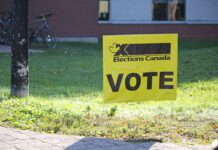by Rachel Everett-Fry
Political spin is a propaganda technique characterized as an attempt to control communication in order to deliver a message in a manner most beneficial to one’s own interests. Politicians can protect themselves from admitting that they made a mistake, or that they made a promise they will not be able to keep, by carefully choosing their language. Political spin is not necessarily a lie, but it is a way of concealing the truth.
Since Justin Trudeau called the federal election on August 15, our online community forums have been buzzing as residents of our riding discuss whether or not they will re-elect Michael Barrett as our MP. Many of these conversations circle around Mr. Barrett’s vote against Bill C-6, the federal ban on conversion therapy. Some state that his vote against Bill C-6 led them to withdraw support, others support Mr. Barrett’s vote, and still others continue to believe that Mr.Barrett voted against the ban because it didn’t go far enough to protect LGBTQ2+ people.
To be clear, it is my opinion that Mr. Barrett’s vote against Bill C-6 is indefensible. But the bill itself is not what I aim to discuss here. Rather, this is a locally relevant instance of political spin.
When the media, myself included, caught wind of Mr. Barrett’s vote and reached out for an explanation, we were issued a release that became part of his standard public explanation of his vote. In the statement, Mr. Barrett says: “I am unequivocal in my opposition to conversion therapy and attempts to forcibly change a person’s sexual orientation.” And that he believes greater “clarity in the bill would support members of the LGBTQ2+ community.”
But here’s the spin: the clarity in the bill that Mr. Barrett and other conservative MPs advocated for has a number of implications that would still allow conversion therapy to be legally practiced. A vote against Bill C-6 is underpinned by the notion that being an LGBTQ2+ person is something that can, or even ought, to be corrected. For instance, the changes to the bill proposed by conservatives would still permit practices in which minors forcibly undergo conversion therapy at the discretion of their parent(s) or legal guardian. This is in fact the vulnerable group that the bill aims to protect. Bill C-6 already contains a clause in which consenting adults could undergo conversion therapy should they wish to do so. Mr. Barrett’s claim to support the LGBTQ2+ community while the contents of the proposed changes to the bill demonstrate the opposite is a prime example of political spin.
People who fall for the spin can’t be blamed: while Mr. Barrett states his support for the LGBTQ2+ community in plain language, the contents of the bill are incredibly complex. It took me the better part of an hour to parse out the disjuncture between his claims and his actions.
It is of course not just Mr. Barrett who uses techniques such as this; spin is a pervasive political technique across party lines. On a federal level, one could understand the Liberal climate plan as spin. While his platform promises clean technologies and to tackle oil and gas emissions, Canada is the only G7 nation to actually increase emissions since Trudeau signed the 2016 Paris Agreement.
Political spin is hard to deal with because even if you aim to research and educate yourself, obscure language can conceal any number of hidden truths. Had he been honest, Mr. Barrett would have said that he supports parents’ and guardians’ right to decide if the minors under their care ought to undergo conversion therapy. Then we would all have the facts clearly laid out before us.
So if we can’t rely on politicians to give us a straight answer, who are we to trust? I would propose that trusting more in members of our own community is part of the solution. Of course, all individuals must research, reflect, and form their own opinions. But the very word political refers to polis: the greek word for city and the people who fill it. We are not just individuals, but members of communities. When a neighbour explains how a political decision affects that person or family member, it is an opportunity to learn and adjust our points of view in order to accommodate more than just ourselves. Politicians will likely never learn your name or know how you voted, but your fellow community members will remember if you take their viewpoints, arguments, and contributions to heart.







